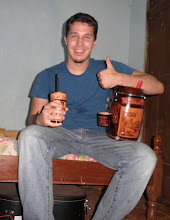Well hello again! I promise I'm dead or maimed.
GUARANÍ.
Below is an extract from a book that I bought from a greasy, unshaven man at the bus terminal several weeks back. (Though I must admit that I was a bit greasy and unshaven myself at the time of purchase.) The book is all about Paraguayan Folklore. It is written in "Guaraní Guaraní" on one page, and Spanish on the opposite.
This is the myth of the Pombero, a very strong cultural phantasm that makes even adults nervous when it begins to get dark out...
~~~~~
Pombero rehegua:
Pombéro ningo tuicha ikurundu ha puéicha rupi ikatu ñanembotavy. Sapy'ánte oĩ ñande ypyetépe hína ha ni nañamalisiái hese. Odipara jave ndaipóri ohupyty va'erã chupe, ku yvytúicha ndajapillái mba'éichapa ova oĩhágui. Oha'ãngakuaaiterei enterove guyrápe, ha upéicha jave ndajaikuaái voi mavaitévapa la ha'etéva. Katu umi animal oikuaa chupe. Ohendúramo oñe'ẽ karai Pombéro ijapytepekuéra, ha'ekuéra oñemokirirĩetéma haitýpe.
Pombéro ndaje ijaukueterei ha haguepaite ipopyte entéro voi. Heta lája virtu voi ndaje oguereko, ha upéicha rupi ikatu oiko oimeraẽva mba'érmo. Sapy'ánte oiko chegui mbopi, guyra, yvyra rapokue térã yvyra matakue hamba'e. Ipypore ndojekuaái voi, ha'e ndohejaséiramo. Ára vai hamba'éramo ndaje oike ogakue guýpe térã tatakuápe okañy, ãga ohasa peve ára pochy. Peichahárupi oĩ he'íva ohechaha ichupe: isombréro piri guasu ndaje ha ikasõ revi guejy, oje'e hese. Hakatu hasy hína upéva, si ha'e iko'ẽmbáta hamba'éramo, Oikónte chugui karáncho ha oveve karape guasu ohóvo.
Jajehayhuka hag̃uã Pombéro ndaje jaheja va'erã chupe cada pyhare, ñemiháme, petỹ hũ inakorã, ryguasu rupi'a ha kañami angu'ápe. Upéva ndaje ombovy'aiterei chupe ha ãga upéi ha'e oguerúma avei la irregálo, péicha eíra panal, yva ka'aguy hamba'e oheja la iñamígo róga rokẽme. Avei oñangareko enterove hogagua rehe, ani hag̃uã itie'ỹva oja tei hese.
Ha la ipochýramo dnaje, ipochýma. Sapy'ánte la iñamígo hesaráiramo ha ndohejái chupe la angu'apegua, Pombéro ipochýma handive. Osẽ jave, opersegíma chupe: omoĩ ita guasu hamba'e hapépe térã odesatina chupe ka'aguyha rupe. Péicha ipochy jave ndaje, ñahendu guyra vaicha operere la ijerépe ha upéi opoíma mba'e ne.
Upéicha Pombéro ipochy jave ndaje, pe máva nosẽi na'erã ogueraha'ỹre reve voi. Upévagui añoite ndaje Pombéro okyhyje.
~~~~~
Now wasn't that exciting? I certainly thought so, for the 60% or so that I understood. (You can read about the Pombero in English on Wikipedia, though no internet source I have come across quite matches what Paraguayans have told me.) Just wait until you hear about the Kurupí. ;)
This selection was (almost) entirely in Guaraní Guaraní, or "Pure Guaraní". In reality, very few people speak "pure" Guaraní, or even really understand it. Most people speak Jopará, a mixture of Spanish and Guaraní. (The very word jopara means "to mix" in Guaraní.) The relative Guaraní-to-Spanish ratio really depends on a lot of things, including who is speaking, what they're talking about, and if they want you to understand or not. I have experienced this last aspect quite a bit. People who know that I won't understand them if they speak very quickly and in Guaraní nte will often use this tool to their advantage. Oy!
My site is very rural, and the majority of the community is either very old, or very young. People of "productive age" tend to move out of Ka'itá to go get jobs in Cnl. Oviedo or Asunción. Therefore, I hear very little Spanish on a day to day basis. True, most of my neighbors at least understand Spanish, and quite a few speak it quite well, but unless they're talking to the 'dumb americano', the Colonial Language is very rarely used in pleasant conversation.
BUT my Guaraní is improving. Not very rapidly, but any improvement is a victory. Guaraní requires that you think backwards – a mental exercise that will hopefully save me from Alzheimer's in the second half of this century. It also requires that I listen carefully not only to what is said, but to why and how they say it. Every word is a rabbit hole, with two, three, four or more meanings depending on the context. Most of them are dirty. I have made quite a few embarrassing/hilarious mistakes.
Language barriers are always a problem, in nearly any international context. But let me tire you now with a very old adage that is so very, very true: "Actions speak louder than words."
All of my students know that I am "tavy" (stupid/crazy/ignorant). Yet when I come to school every day, I see so much excitement! They ask when we're going to play math bingo, or do a teamwork exercise, or play "Escalera de la Muerte" (basically, hangman), or any other activity or game I have prepared for them! And my teachers have definitely noticed.
Patience and perseverance.

I hate how easily can distract me. After reading about the Pombero, I then spent nearly an hour on wikipedia reading about Guarani mythology until I finally remembered that I had originally been reading the blog. Interesting stuff.
ReplyDelete